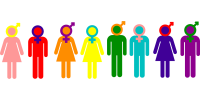Difference between revisions of "Queer Theorists"
| Line 10: | Line 10: | ||
It is not surprising to see prominent LGBTQ queer theorists in many parts of the world. We have identified individuals from Germany, Spain, New Zealand, the United States, Croatia, Argentina, Sweden, and Great Britain. Simply click on their names to read their fascinating biographies and view links to their research and writings: | It is not surprising to see prominent LGBTQ queer theorists in many parts of the world. We have identified individuals from Germany, Spain, New Zealand, the United States, Croatia, Argentina, Sweden, and Great Britain. Simply click on their names to read their fascinating biographies and view links to their research and writings: | ||
| − | * [[ | + | '''Argentina''' |
| − | * [[ | + | |
| − | * [[ | + | * [[Mauro Cabral]] |
| − | * [[ | + | |
| − | * [[ | + | '''Croatia''' |
| − | * [[ | + | |
| − | * [[ | + | * [[Mima Simic]] |
| − | * [[ | + | |
| − | * [[ | + | '''France''' |
| − | * [[ | + | |
| − | * [[ | + | * [[Michel Foucault]] |
| − | * [[ | + | * [[Guy Hocquenghem]] |
| − | * [[ | + | * [[Genevieve Pastre]] |
| − | * [[ | + | |
| − | * [[ | + | '''Germany''' |
| − | * [[ | + | |
| − | * [[ | + | * [[Dr. Magnus Hirschfeld]] |
| − | * [[ | + | * [[Karl Heinrich Ulrichs]] |
| − | * [[ | + | |
| − | * [[ | + | '''Great Britain''' |
| − | * [[ | + | |
| − | * [[ | + | * [[Jeffrey Weeks]] |
| − | * [[ | + | |
| − | * [[ | + | |
| + | '''New Zealand''' | ||
| + | |||
| + | * [[Annamarie Jagose]] | ||
| + | |||
| + | '''Spain''' | ||
| + | |||
| + | * [[Juan Vincente Aliaga]] | ||
| + | |||
| + | '''Sweden''' | ||
| + | |||
| + | * [[Tiina Rosenberg]] | ||
| + | |||
| + | '''United States''' | ||
| + | |||
| + | * [[Gloria Anzaldua]] | ||
| + | * [[Ryka Aoki]] | ||
| + | * [[Karen Barad]] | ||
| + | * [[Leo Bersani]] | ||
| + | * [[Judith Butler]] | ||
| + | * [[David M. Halperin]] | ||
| + | * [[Emma Heaney]] | ||
| + | * [[Jonathan Ned Katz]] | ||
| + | * [[Jose Esteban Munoz]] | ||
| + | * [[David Powell]] | ||
| + | * [[Jordy Rosenberg]] | ||
| + | * [[Gayle Salamon]] | ||
| + | * [[Julietta Singh]] | ||
| + | * [[Susan Stryker]] | ||
==See Also== | ==See Also== | ||
Revision as of 22:40, 12 February 2019
There are a number of LGBTQ academics, social commentators, activists, and others who specialize in the theory, or developed a reputation for their analysis, of the notion of 'queerness'. Their work often focuses on the examination of sexual identity and activity, the social context of this, its historical context, and the community itself. In general, queer theory looks at gender roles, the relationship between sex and gender, the notions of gay and straight, and the full spectrum of gender identity and activity.
This field of study is relatively new in terms of nomenclature and organization, but there are historical individuals who laid informal foundations for today's collective group of thinkers. It is generally agreed that Guy Hocquenghem is the principle individual to lay the formal groundwork for queer theory, and that it was originally associated with the radical gay politics of groups (such as ActUp) which embraced the notion of being queer, and of which Guy participated. However, Hocquenghem was preceded in thought by individuals such as Dr. Magnus Hirschfeld and pioneer activist Karl Heinrich Ulrichs. Today, it is a diverse field of study that involves a lot of disparate ideas around the concepts of what is normal when it comes to sex, gender, and sexual activity. Judith Butler and her academic associate and LGBTQ ally Eve Sedgewick are perhaps today's leading lights in the field.
Queer theorists move beyond the modern binary notion of homosexual and heterosexual and argue that sexuality exists on a continuum which reflects diversity of behaviour - and has so throughout history. Their thinking impacts the study of literature, history, sociology, psychology, politics, and more.
It is not surprising to see prominent LGBTQ queer theorists in many parts of the world. We have identified individuals from Germany, Spain, New Zealand, the United States, Croatia, Argentina, Sweden, and Great Britain. Simply click on their names to read their fascinating biographies and view links to their research and writings:
Argentina
Croatia
France
Germany
Great Britain
New Zealand
Spain
Sweden
United States
- Gloria Anzaldua
- Ryka Aoki
- Karen Barad
- Leo Bersani
- Judith Butler
- David M. Halperin
- Emma Heaney
- Jonathan Ned Katz
- Jose Esteban Munoz
- David Powell
- Jordy Rosenberg
- Gayle Salamon
- Julietta Singh
- Susan Stryker
See Also
- Academics Specializing in the History of the LGBTQ Community
- LGBTQ Leaders in Higher Education
- LGBTQ Librarians and Archivists
- LGBTQ Curators at Museums and Art Galleries
- LGBTQ Individuals in the Fields of Sociology and Anthropology

